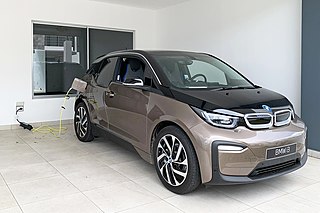Related Research Articles
Think Global was a Norwegian electric car manufacturer located in Bærum, which manufactured cars under the TH!NK brand. Production of the Think City was stopped in March 2011 and the company filed for bankruptcy on June 22, 2011, for the fourth time in 20 years. The company was bought soon after by Electric Mobility Solutions AS and production ceased in August 2012 with no more announcements regarding future production. As of October 2010, a total of 2,500 units had been manufactured at Oslo-based TH!NK's production facility.

An electric vehicle (EV) is a vehicle that uses one or more electric motors for propulsion. The vehicle can be powered by a collector system, with electricity from extravehicular sources, or can be powered autonomously by a battery or by converting fuel to electricity using a generator or fuel cells. EVs include road and rail vehicles, electric boats and underwater vessels, electric aircraft and electric spacecraft.

A zero-emission vehicle, or ZEV, is a vehicle that does not emit exhaust gas or other pollutants from the onboard source of power. The California definition also adds that this includes under any and all possible operational modes and conditions. This is because under cold-start conditions for example, internal combustion engines tend to produce the maximum amount of pollutants. In a number of countries and states, transport is cited as the main source of greenhouse gases (GHG) and other pollutants. The desire to reduce this is thus politically strong.

A Neighborhood Electric Vehicle (NEV) is a U.S. category for battery electric vehicles that are usually built to have a top speed of 25 miles per hour (40 km/h), and have a maximum loaded weight of 3,000 lb (1,400 kg). Depending on the particular laws of the state, they are legally limited to roads with posted speed limits of 35 miles per hour (56 km/h) or less. NEVs fall under the United States Department of Transportation classification for low-speed vehicles. The non-electric version of the neighborhood electric vehicle is the motorized quadricycle.

The Toyota RAV4 EV is an all-electric version of the popular RAV4 SUV produced by Toyota until 2014. Two generations of the EV model were sold in California, and to fleets elsewhere in the US, with a gap of almost ten years between them.

Crude electric carriages were first invented in the late 1820s and 1830s. Practical, commercially available electric vehicles appeared during the 1890s. An electric vehicle held the vehicular land speed record until around 1900. In the early 20th century, the high cost, low top speed, and short-range of battery electric vehicles, compared to internal combustion engine vehicles, led to a worldwide decline in their use as private motor vehicles. Electric vehicles have continued to be used for loading and freight equipment and for public transport – especially rail vehicles.

The Honda Clarity is a nameplate used by Honda on alternative fuel vehicles. It was initially used only on hydrogen fuel-cell electric vehicles such as the 2008 Honda FCX Clarity, but in 2017 the nameplate was expanded to include the battery-electric Honda Clarity Electric and the plug-in hybrid electric Honda Clarity Plug-in Hybrid, in addition to the next generation Honda Clarity Fuel Cell. Clarity production ended in August 2021 with US leases for the fuel cell variant continuing through to 2022.

An electric truck is a battery electric vehicle (BEV) designed to transport cargo, carry specialized payloads, or perform other utilitarian work.
Aptera Motors Corp. is an American crowd funded, pre-production startup company based in Carlsbad, California. It was founded in 2005 before liquidating in 2011. The company was relaunched by the original founders in 2019.
Hybrid vehicle drivetrains transmit power to the driving wheels for hybrid vehicles. A hybrid vehicle has multiple forms of motive power.

An alternative fuel vehicle is a motor vehicle that runs on alternative fuel rather than traditional petroleum fuels. The term also refers to any technology powering an engine that does not solely involve petroleum. Because of a combination of factors, such as environmental and health concerns including climate change and air pollution, high oil-prices and the potential for peak oil, development of cleaner alternative fuels and advanced power systems for vehicles has become a high priority for many governments and vehicle manufacturers around the world.

ZAP was an American company that specialized in electric vehicles of various types, such as cars, motorcycles, bicycles, scooters, watercraft, hovercraft, ATVs and commercial vehicles. Its name was an acronym for Zero Air Pollution. It was based in Santa Rosa, California, but it is no longer active. The last record of the company in the California Secretary of State business entity database shows that its agent for service of process resigned on October 26, 2016.

A charging station, also known as a charge point, chargepoint, or electric vehicle supply equipment (EVSE), is a power supply device that supplies electrical power for recharging plug-in electric vehicles.

An electric car or electric vehicle (EV) is a passenger automobile that is propelled by an electric traction motor, using only energy stored in on-board batteries. Compared to conventional internal combustion engine (ICE) vehicles, electric cars are quieter, more responsive, have superior energy conversion efficiency and no exhaust emissions and lower overall vehicle emissions. The term "electric car" normally refers to plug-in electric vehicle, typically a battery electric vehicle (BEV), but broadly may also include plug-in hybrid electric vehicle (PHEV), range-extended electric vehicle (REEV) and fuel cell electric vehicle (FCEV).

A battery electric vehicle (BEV), pure electric vehicle, only-electric vehicle, fully electric vehicle or all-electric vehicle is a type of electric vehicle (EV) that exclusively uses chemical energy stored in rechargeable battery packs, with no secondary source of propulsion. BEVs use electric motors and motor controllers instead of internal combustion engines (ICEs) for propulsion. They derive all power from battery packs and thus have no internal combustion engine, fuel cell, or fuel tank. BEVs include – but are not limited to – motorcycles, bicycles, scooters, skateboards, railcars, watercraft, forklifts, buses, trucks, and cars.

The adoption of plug-in electric vehicles in the United States is supported by the American federal government, and several states and local governments.

Proterra Inc. was an American electric vehicle and powertrain manufacturer based in Burlingame, California. The company designed and manufactured battery electric transit buses, powertrain systems for other heavy-duty vehicle builders and charging systems for fleets of heavy-duty vehicles.
The University of Kansas Sustainable Automotive Energy Infrastructure Initiative, or more commonly referred to as the KU Ecohawks is an ongoing project that works to promote sustainability in the automotive sector. Founded during the beginning of the Automotive industry crisis of 2008–2010 in the U.S., the group recycles old vehicles to run on community wastes and renewables, especially on the University of Kansas campus and not rely on conventional fossil fuel sources that pollute the local and global environment.
References
- ↑ "CEOs & Generals Plug In; Iceland Giving Up on Hydrogen". www.calcars.org.
- ↑ Battery packs, batteries, and chargers
- ↑ "Custom Golf Carts by ACG, Inc". acgcars.us.
- ↑ "Home | Arctic Cat". arcticcat.txtsv.com.
- ↑ "Batteries - Phone Repairs - Light Bulbs - Chargers at Batteries Plus". Batteries Plus. April 24, 2019.
- ↑ "Loading..." www.ca-green.com.
- 1 2 "icanEV | canEV electrifying vehicles for people and business". Canadian Electric Vehicles (canEV and icanEV).
- ↑ "EVSE | Electric Vehicle (EV) Charging Stations". ChargePoint.
- ↑ Home - Columbia Parcar Corp
- 1 2 "Earth Friendly Moving :: A Buck : A Box : A Week". www.earthfriendlymoving.com. Archived from the original on 2007-03-26.
- ↑ "Eco-Limo". ecolimo.com.au.
- ↑ "Elite Power Solutions". Elite Power Solutions.
- ↑ "Introducing the EXV4 & EXV2". Archived from the original on September 7, 2008. Retrieved September 25, 2008.
- ↑ "index". Archived from the original on 2015-08-01. Retrieved 2019-09-24.
- ↑ "electricbluemotors.com". www.electricbluemotors.com.
- ↑ "Free Drive EV - Solar Bug". Archived from the original on August 28, 2008. Retrieved September 25, 2008.
- ↑ "Global Green".
- ↑ Green Products, Green Building Materials | Green Depot
- ↑ "Hiperformance Electric AC Motors for Golf Carts and Utility Vehicles". Archived from the original on 2006-12-08. Retrieved 2018-10-13.
- ↑ Under Construction | HostMetro.com Archived September 5, 2008, at the Wayback Machine
- ↑ "invest green". Archived from the original on July 3, 2008. Retrieved September 25, 2008.
- ↑ https://junglemotors.com Archived December 16, 2008, at the Wayback Machine
- ↑ "Home | Los Angeles County Bicycle Coalition". Los Angeles County B.
- ↑ "Austin Alt Car: Austin Energy ends Plug-in Partners, unveils new smart charging software". autoblog.com. October 18, 2008.
- ↑ "Prometheus Solar | Northern Arizona & Flagstaff Solar Installations". Prometheus Solar.
- ↑ "Nationwide Commercial Solar Energy Company". Duke Energy Sustainable Solutions.
- ↑ "Roush Enterprises". Archived from the original on 2017-10-26. Retrieved 2019-05-16.
- ↑ "Santa Monica Office of Sustainability and the Environment: Solar Santa Monica". www.smgov.net.
- ↑ "SO.CA.TA". SO.CA.TA. Archived from the original on July 15, 2008.
- ↑ "Warehousing, Transportation, Packaging, Logistics - States Logistics". States Logistics Services.
- ↑ "My Blog – My WordPress Blog".
- ↑ "Sustainable Works Home".
- ↑ "T3 Motion | The #1 Personal Transportation Provider for Law Enforcement and Security Worldwide". www.t3motion.com.
- ↑ Tellurian Biodiesel » Home
- ↑ "Bikerowave". Bikerowave. Archived from the original on December 22, 2008.
- ↑ The Electric Car Company of Long Beach
- ↑ "The National Transit Coalition". Archived from the original on 2009-02-16. Retrieved 2020-06-14.
- ↑ "Tom's Truck Center - Since 1949".
- ↑ "trioBike - 's Werelds eerste bakfiets die ook gebruikt kan worden als ee..." Archived from the original on September 17, 2008. Retrieved September 25, 2008.
- ↑ "Vantage Vehicle International, Inc". Vantage Vehicle.
- ↑ "Welcome To Zero Motorcycles". www.zeromotorcycles.com.